The War Of The Worlds (Steven Spielberg, 2005)
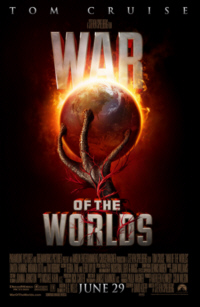
I can't remember the last time I left a movie theatre feeling this elated.
The War Of The Worlds as re-imagined by Steven Spielberg and writer David Koepp
is without doubt the most visceral and devastating alien invasion movie ever made.
I'll turn to the important question of how good an adaptation it is of Wells' 1898
book at the end of this review, but for now I want to focus on the those areas of
the film that resist any attempt at criticism.
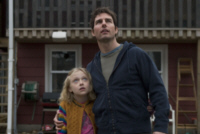 For
all its impressive scale and bombast, this is at heart a movie about family
and the way in which the most ordinary of people can aspire to greatness when the
chips are down. Tom Cruise turns in a stellar performance in this regard, investing
his character of Ray Ferrier with a depth and sophistication that no amount of
special effects can eclipse. Ferrier is a loser and a wastrel. Worse still he has
every appearance of being comfortable in this existence and appears not to care who
knows it, but we learn pretty soon on that beneath the cavalier exterior, he really
yearns for the love and respect of his kids and continues to have feelings for his
estranged wife. It's a subtle, nuanced performance and a credit to Cruise that it
takes some time for the viewer to warm to him as a hero. That big question mark
about his character hovers about him longer than you'd normally expect in a movie
of this type. Don't expect Cruise to strip down to his vest and do a Bruce Willis
on the aliens the moment the first Tripod appears. At the half way point as he and
his family flee the aliens in a ferry boat, he watches his son heroically For
all its impressive scale and bombast, this is at heart a movie about family
and the way in which the most ordinary of people can aspire to greatness when the
chips are down. Tom Cruise turns in a stellar performance in this regard, investing
his character of Ray Ferrier with a depth and sophistication that no amount of
special effects can eclipse. Ferrier is a loser and a wastrel. Worse still he has
every appearance of being comfortable in this existence and appears not to care who
knows it, but we learn pretty soon on that beneath the cavalier exterior, he really
yearns for the love and respect of his kids and continues to have feelings for his
estranged wife. It's a subtle, nuanced performance and a credit to Cruise that it
takes some time for the viewer to warm to him as a hero. That big question mark
about his character hovers about him longer than you'd normally expect in a movie
of this type. Don't expect Cruise to strip down to his vest and do a Bruce Willis
on the aliens the moment the first Tripod appears. At the half way point as he and
his family flee the aliens in a ferry boat, he watches his son heroically 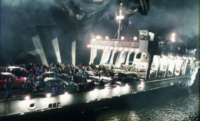 rescue
struggling refugees and you really feel that he is torn between feeling proud of his
son and guilt that he is standing by doing nothing and indeed has left others behind. rescue
struggling refugees and you really feel that he is torn between feeling proud of his
son and guilt that he is standing by doing nothing and indeed has left others behind.
As supporting characters, both Justin Chatwin as son Robbie and Dakota Fanning
as his daughter Rachel are perfectly cast. Chatwin plays teen angst well and his
gung ho fight back at all costs attitude, which borders on the suicidal, is an
interesting contrast to that of Ferrier. Fanning is superb if a little scary.
Someone this young should not be able to act that well, though considering what
she has to go through in this movie, it is a wonder she was not traumatised for life.
After a very brief but information packed introduction to the Ferrier family, the
movie kicks into high gear with the emergence from underground of a Tripod right on
Ferrier's doorstep. This is a simply stunning moment. Remember the scene in the
Terminator (the first one) when Arnie first appears and after a moment's introspection,
rises to his feet. Well scale that up a thousand fold and you've got a good idea of
how full of menace that Tripod looks as it unfurls itself and rises to its full
intimidating height. It's a reveal shot that just takes the breath away.
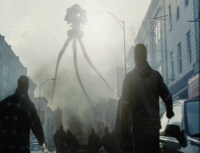 And indeed those Tripods are a revelation. Finally we get to see these horrors
as intended, great three legged monstrosities striding across the earth, unstoppable
and implacable. The design is amazing, like nothing ever seen on film. Credit must
not only go to Dennis Muren and his team at ILM, but to who ever came up with the
sound they make. I think a lot of people will go into this movie with a preconceived
notion of the Tripods call, likely clouded by the undoubtedly effective interpretation
of Jeff Wayne. I know I did. What we get instead is something indescribable. What can
I say? Think a very congested elephant blowing a trumpet. It's the most alien sounding
thing I have ever heard, and when that unearthly call reverberates around your ears
and you know those things are getting close, I guarantee you are going to find
yourself sinking into your seat and your hands tensing in expectation of something very bad. And indeed those Tripods are a revelation. Finally we get to see these horrors
as intended, great three legged monstrosities striding across the earth, unstoppable
and implacable. The design is amazing, like nothing ever seen on film. Credit must
not only go to Dennis Muren and his team at ILM, but to who ever came up with the
sound they make. I think a lot of people will go into this movie with a preconceived
notion of the Tripods call, likely clouded by the undoubtedly effective interpretation
of Jeff Wayne. I know I did. What we get instead is something indescribable. What can
I say? Think a very congested elephant blowing a trumpet. It's the most alien sounding
thing I have ever heard, and when that unearthly call reverberates around your ears
and you know those things are getting close, I guarantee you are going to find
yourself sinking into your seat and your hands tensing in expectation of something very bad.
From the first emergence of a Tripod, the movie is simply about survival on a
very personal and narrowly focused scale. Spielberg and Koepp purposefully
steered away from scenes in underground military bunkers with big screens and
generals plotting attacks. The soldiers we see are grunts, hopelessly outgunned
and we never feel anything like hope for them. As they rumble past on their
vehicles, we know they are all going to die. Ferrier and his family are just
helpless observers to the carnage.
And what carnage it is. I was amazed that in the UK this movie rated a 12A
certification (which means its open to any age as long as an adult accompanies).
I don't think I'd want my 7-year-old daughter coming near this movie until well
into her teens. The horror is intense and largely unremitting. It is also pretty
disturbing. Bodies flowing in the hundreds down a river do not a happy movie make.
As a father I also found myself thinking of my own daughter safely tucked up in
bed and what I would do in a similar situation. There is a point in the movie
where despair and horror reach an absolute nadir and though not strongly implied,
I suspect that Ferrier is giving serious consideration to killing his own
daughter rather than let her fall into the hands of the aliens. I'm probably
reading that possibility into the film, but again, it is to Cruise's credit that
his performance puts these thoughts into your head.
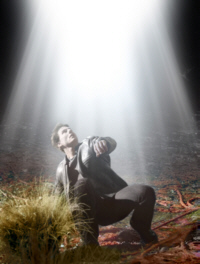 I don't really want to give too much more of the plot away, so I'll close on
the important question of faithfulness to the book. So is H G Wells spinning in
his grave? The answer is no, (though he may be gently rotating) but undoubtedly
something has been lost in translation. None of the following observations damage
the movie unduly but they are worth noting. Most important I think was the decision
to remove the connection to Mars. Spielberg says no one is going to believe aliens
from Mars, but this is science fiction, so I don't accept that as a valid argument.
Crucially, by removing the Martian aspect, you also lose something really important,
the entire political sociological subtext that was so important to Wells. He wrote
his novel for a number of reasons, one of which was to make a statement that we
cannot always expect to be the most powerful force in the universe. This concept
is retained in Morgan Freeman's opening narration (effectively doing the voice of
Orson Welles) but it never really goes anywhere after that. I don't really want to give too much more of the plot away, so I'll close on
the important question of faithfulness to the book. So is H G Wells spinning in
his grave? The answer is no, (though he may be gently rotating) but undoubtedly
something has been lost in translation. None of the following observations damage
the movie unduly but they are worth noting. Most important I think was the decision
to remove the connection to Mars. Spielberg says no one is going to believe aliens
from Mars, but this is science fiction, so I don't accept that as a valid argument.
Crucially, by removing the Martian aspect, you also lose something really important,
the entire political sociological subtext that was so important to Wells. He wrote
his novel for a number of reasons, one of which was to make a statement that we
cannot always expect to be the most powerful force in the universe. This concept
is retained in Morgan Freeman's opening narration (effectively doing the voice of
Orson Welles) but it never really goes anywhere after that.
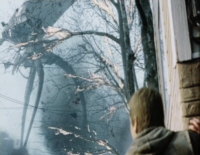 Wells had a lot in mind when he wrote the book. First, that the Martians were
motivated by a need to find resources to survive as a society and species. Then
he wanted to register his indignation at the appalling treatment of technologically
lesser societies at the hands of imperialist powers like Britain, who just like
his Martian aggressors were all too willing to embark on genocidal programs of
pacification to secure their superiority. All of this is lost in Spielberg's movie.
Who are these aliens, what do they really want? We meet them once in what is
essentially the buried house scene from the original novel, but we don't really
learn anything about them except that they are curious about us. Instead they
are painted as completely xenophobic monsters without reason or motivation for their attack. Wells had a lot in mind when he wrote the book. First, that the Martians were
motivated by a need to find resources to survive as a society and species. Then
he wanted to register his indignation at the appalling treatment of technologically
lesser societies at the hands of imperialist powers like Britain, who just like
his Martian aggressors were all too willing to embark on genocidal programs of
pacification to secure their superiority. All of this is lost in Spielberg's movie.
Who are these aliens, what do they really want? We meet them once in what is
essentially the buried house scene from the original novel, but we don't really
learn anything about them except that they are curious about us. Instead they
are painted as completely xenophobic monsters without reason or motivation for their attack.
Wells social comment is as valid today as when pen was first laid to paper
and while I would not have wanted Spielberg to bludgeon the viewer with crude
allegorical statements on the present situation in Iraq. I am sure that many
an Iraqi has felt as helpless as Ferrier in the face of overwhelming western firepower.
In essence however, those familiar with the book will find much to recognise
in the script, though as I have long suspected from Spielberg's comments, this
movie clearly owes as much to the Orson Welles broadcast as it does the original
novel. Spielberg bought an original (and possibly only remaining copy) of the 1938
broadcast script and one wonders if the New Jersey locations were an intentional
homage. Certainly the movie evokes the panic that Orson Welles achieved that Halloween
night. If I have one final misgiving, it is that the ending could have been a lot
darker. It was just a little too happy for my liking. After so much death and
destruction, so much evidence that the human race is getting a pasting the likes
of which it has never experienced before, the ending just feels a little too trite
and contrived. I'd hoped Spielberg would do better in this respect than the likes
of Independence Day. However, don't forget that at the end of the Wells novel, the narrator does get
home and find his wife alive and well.
But for all that, what we have here is I think the first truly great alien
invasion movie, the one against all future movies of that type must be judged.
If it ever happens for real, this is how it is going to be. The military will fail
us, cities will fall and it will be every man for himself. And most assuredly, the
Fresh Prince of Bel Air is not going to swoop from the sky and save us.
|
Buy
See also in:
Film & TV
|
1953
The War Of The Worlds by George Pal. The action relocates to cold war America, with the Martian war machines re-invented as sinister flying machines.
|
|
1968
Robinson Crusoe On Mars. The Martian war machines from the George Pal movie are the foe for an astronaut stranded on Mars.
|
|
1975
War Of The Worlds TV Series by George Pal. Who knew that George Pal once planned a television series spin off from his 1953 movie?
|
|
1988
War Of The Worlds An intermittently impressive TV series about a second Martian invasion of Earth.
|
|





